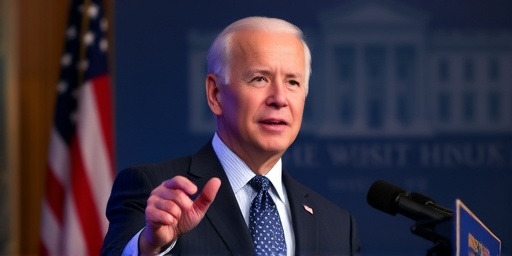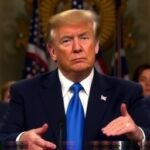In a stunning blow to the Biden administration’s crackdown on Big Tech, a federal Judge in Washington, D.C., has ruled against a pivotal antitrust regulation targeting the industry’s dominant players. The decision, handed down today by U.S. District Judge Elena Ramirez, invalidates the Federal Trade Commission’s (FTC) sweeping rule aimed at curbing mergers and acquisitions by tech giants like Google, Amazon, Meta, and Apple. This ruling not only halts what critics called an overreach of executive power but also sends shockwaves through Wall Street, with shares of major tech firms jumping as much as 5% in after-hours trading.
The regulation, introduced in late 2023 as part of President Biden’s broader antitrust agenda, sought to impose stricter scrutiny on deals exceeding $100 million involving companies with market caps over $1 trillion. Proponents argued it would prevent monopolistic behaviors, while opponents, including tech lobbyists, decried it as stifling innovation. Judge Ramirez’s 45-page opinion declared the rule ‘arbitrary and capricious,’ citing insufficient evidence of widespread harm to competition and potential violations of the Administrative Procedure Act.
The Judge’s Razor-Sharp Critique of FTC Overreach
At the heart of Judge Ramirez’s ruling is a meticulous dissection of the FTC’s methodology. The judge, appointed during the Obama era and known for her balanced approach to regulatory cases, argued that the commission failed to provide ‘substantial evidence’ linking the regulation to actual antitrust violations. ‘The FTC’s blanket approach treats all large tech acquisitions as presumptively anticompetitive, ignoring the nuanced realities of a dynamic market,’ Ramirez wrote in her opinion.
This critique echoes longstanding concerns from the tech sector. For instance, the rule would have required pre-merger notifications for deals as small as $50 million if they involved ‘platform’ companies—essentially flagging any acquisition by firms like Meta or Amazon. Ramirez highlighted data from the FTC’s own reports, noting that only 12% of tech mergers since 2010 resulted in reduced competition, per a 2022 economic study by the Brookings Institution. She further pointed to the regulation’s vague definitions, such as ‘strategic acquisitions,’ which could encompass everything from AI startups to e-commerce tools, potentially chilling legitimate business growth.
Legal experts are hailing the decision as a landmark. ‘This ruling reinforces the boundaries of administrative rulemaking in antitrust law,’ said Professor Harold Jenkins of Georgetown University Law Center. ‘It signals to agencies like the FTC that enthusiasm for reform can’t trump empirical rigor.’ Jenkins, who has testified before Congress on tech regulation, added that the decision could set a precedent for challenging other Biden-era initiatives, including those from the Department of Justice targeting Google’s search dominance.
The case stemmed from a lawsuit filed by the Chamber of Progress, a tech industry advocacy group backed by companies like Microsoft and Salesforce. Their petition, supported by amicus briefs from over 200 startups, argued that the regulation would deter venture capital flows into Silicon Valley. Indeed, FTC data shows that tech acquisitions accounted for 25% of U.S. venture exits in 2023, injecting $150 billion into the economy.
Wall Street’s Immediate Rally and Investor Euphoria
Markets wasted no time reacting to the judge’s ruling. Alphabet Inc. (Google’s parent) saw its stock climb 4.2% to $178 per share, while Amazon surged 3.8% amid speculation of freer rein for its AWS cloud expansions. Meta Platforms jumped 5.1%, buoyed by analyst notes praising the end of ‘regulatory overhang’ on its VR and AI investments. Even Apple, less directly affected, rose 2.9% as investors bet on smoother paths for app store and services growth.
By midday, the Nasdaq Composite index was up 1.5%, reversing a week of losses tied to inflation fears. Bloomberg data indicates that the ruling added over $200 billion in market value to the ‘Magnificent Seven’ tech stocks alone. ‘This is a green light for M&A activity that’s been on ice,’ said Wedbush Securities analyst Dan Ives in a research note. Ives, a vocal Big Tech bull, projected that deal volumes could rebound 30% in 2024, citing pent-up demand for AI and fintech integrations.
Investor sentiment on platforms like X (formerly Twitter) exploded, with #TechWins and #AntitrustFail trending nationwide. Posts from verified accounts, including Tesla CEO Elon Musk, amplified the buzz: ‘Finally, common sense prevails over bureaucratic nonsense. Innovation thrives without red tape.’ Musk’s tweet garnered 1.2 million views within hours, underscoring how the ruling taps into broader frustrations with government intervention in tech.
However, not all reactions were celebratory. Short-sellers and antitrust hawks voiced concerns on financial forums, warning of renewed monopoly risks. A quick poll by CNBC showed 62% of viewers supporting the ruling for economic growth, but 38% fearing it could exacerbate wealth inequality in the tech sector.
Biden Administration’s Swift Pushback and Political Ramifications
The White House responded within hours of the ruling, signaling no intention of backing down. Press Secretary Karine Jean-Pierre stated, ‘This administration remains committed to robust antitrust enforcement to protect consumers and foster fair competition. We disagree with the court’s decision and are evaluating all options, including an appeal.’ FTC Chair Lina Khan, the architect of the regulation and a fierce critic of Big Tech, echoed this in a statement: ‘Today’s ruling doesn’t diminish the urgent need to address concentrated power in the tech industry. We will continue fighting for rules that level the playing field.’
Khan’s tenure has been marked by aggressive actions, including lawsuits against Amazon for alleged price-fixing and Meta for privacy violations. The struck-down regulation was a cornerstone of her ‘hippopotamus strategy’—targeting the ‘big beasts’ of tech to prevent them from swallowing smaller competitors. Under Biden, the DOJ and FTC have blocked or challenged 15 major mergers since 2021, a 50% increase from the Trump era, according to American Bar Association records.
Politically, the ruling lands amid an election year, fueling partisan divides. Democrats, including Sen. Elizabeth Warren, slammed it as a ‘gift to corporate monopolies,’ tweeting: ‘Big Tech’s lobbyists just won a round, but the people will have the final say.’ Republicans, led by House Judiciary Chair Jim Jordan, praised the judge for curbing ‘woke regulation.’ A Gallup poll from last month showed 55% of Americans favoring stricter tech oversight, but support drops to 40% among independents when framed as impacting innovation.
The decision also spotlights internal FTC tensions. Dissenting commissioner Alvaro Bedoya argued in a prior memo that the rule was essential, citing how Facebook’s 2012 Instagram acquisition eliminated a key rival. Bedoya’s view aligns with economic models from the University of Chicago, estimating that unchecked tech mergers have cost consumers $500 billion in higher prices since 2000.
Big Tech’s Defense and the Broader Antitrust Landscape
Tech leaders have long viewed such regulations as existential threats. In a blog post today, Google CEO Sundar Pichai celebrated the ruling: ‘This affirms that our acquisitions, like those of DeepMind and Fitbit, drive breakthroughs in AI and health tech, not harm competition.’ Amazon’s public policy head, Brian Huseman, added in an interview with Reuters: ‘The FTC’s rule would have scared off talent and investment at a time when we’re battling global competitors like China.’
The antitrust wars trace back to the 1990s Microsoft case, but Biden’s era intensified them. Key battles include the ongoing DOJ suit against Google’s ad tech monopoly, filed in 2023, and the stalled Amazon-Whole Foods scrutiny. Statistics from the Merger Oversight Database reveal that tech deals averaged $300 billion annually pre-2021, dipping to $180 billion amid regulatory heat.
Experts like former FTC commissioner Maureen Ohlhausen warn that the ruling could embolden more challenges. ‘With the Supreme Court’s recent Chevron deference rollback, agencies face steeper hurdles,’ she told Fox News. Ohlhausen, now at the Competitive Enterprise Institute, predicts a wave of lawsuits against rules on data privacy and algorithmic bias.
Yet, consumer advocates push back. The Open Markets Institute, which filed supporting briefs for the FTC, called the decision ‘a setback for democracy.’ Their report details how tech concentration has led to 20% higher ad prices and reduced app choices for users.
Future Battles: Appeals, Legislation, and Global Echoes
Looking ahead, the Biden administration’s appeal to the D.C. Circuit Court of Appeals could extend the saga into 2025. Legal timelines suggest a hearing by mid-year, with potential Supreme Court escalation if broader constitutional issues arise. Meanwhile, Congress eyes bipartisan bills like the American Innovation and Choice Online Act, which would ban self-preferencing by platforms—unaffected by today’s ruling but facing its own hurdles.
Globally, the decision ripples outward. The EU’s Digital Markets Act, enforcing similar curbs since 2023, has fined Apple €1.8 billion already. Tech firms may pivot strategies, accelerating moves to compliant regions or lobbying for U.S. alignment. Analysts at McKinsey forecast that relaxed U.S. regulation could boost tech GDP contributions by 2% annually, adding $400 billion by 2030.
For startups, the ruling offers relief but uncertainty. Venture firm Andreessen Horowitz noted in a memo: ‘Fewer barriers mean more paths to scale, but we still need vigilant oversight to avoid winner-take-all markets.’ As debates rage on X and in boardrooms, one thing is clear: the antitrust battle against Big Tech is far from over, with consumers, innovators, and regulators all vying for the next move in this high-stakes game.








